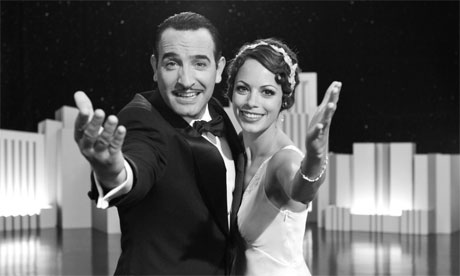
With the announcement of the Oscar nominations, we are now well into awards season; for me this has meant presenting a gong for best film at the London Critics' Circle awards at BFI Southbank – to Michel Hazanavicius and Jean Dujardin, for The Artist. It was also the occasion for some karmic justice: I got terrible reviews for my performance. Unlike the other presenters, who each delivered little gracenotes of insightful wit before giving their awards – making the star-packed audience variously sigh and chuckle with agreement and delight – I did mine absolutely straight, just reading out the nominated films, opening the envelope and saying the winner. My turn was widely condemned as stilted, robotic and boring. After I came off stage, bathed in flop sweat, my friend Larushka Ivan-Zadeh of Metro, demanded: "What's the matter with you? You sounded like some sort of Soviet official reading out the grain statistics."
Sadly, this was not the sum total of the evening's embarrassment. At the party afterwards, I succumbed to an awful delusion to which many journalists are prone, on mixing with non-English-speaking directors and stars at a champagne-fuelled social event, a delusion that it might be pretty darned cool to say a few words to them in their own mother tongue.
I bowled up to Jean Dujardin, shouldered aside his many excited fans and said to him: "Félicitations!" – with full-on accent, I ran the final few syllables together in a whiplash-flourish. Dujardin inclined his head towards me, face creased with a theatrically inquiring, good-natured smile, his eyebrows arched upwards in a way that fans of the film will be able to imagine. Evidently, he had not quite caught what I had said. "Félicitations!" I repeated. Dujardin took a tiny moment to digest this and then replied with an even broader, more good-natured smile: "Grazie!" That's right. He assumed I was Italian. Was it my imagination, or did I see Larushka, within earshot, putting a palm over her face?
But this was not as toe-curling as the way I distinguished myself during the 2009 Cannes film festival, at the after-party for Michael Haneke's film, The White Ribbon. (It may seem bizarre that such a sober film had anything so trivial and boozy as an "after-party", but it did.) First of all, I approached Christian Friedel, who played the schoolteacher, and tried introducing myself in German. After only a few words, he interrupted calmly and politely: "We can speak in English". Even after that, I didn't learn my lesson. Louisa Dent, managing director of the distributor Artificial Eye, offered to introduce me to Haneke himself. Of course I said yes. We approached the great man; Louisa told him who I was, and Haneke gave me a friendly nod. And it was at this point that I said to him: "Ich gratuliere!" – again, full accent, with a bit of a rasp on the "r" sound.
It was only when the words had left my lips that I realised what a fatuous and embarrassing error of taste that was. Haneke briefly held my gaze in quizzical silence and his smile cooled perceptibly. He reminded me very much of the teenage hillbilly in Deliverance, getting rashly challenged to a banjo-duel by the patronising vacationer. At any moment, I felt that someone was about to emerge, dressed in faded-denim dungarees, spit his tobacco-chew on the ground and say: "Day-um boy, y'all goan challenge Mr Han – ay – kah to a German conversation on his own back porch?. As Haneke continued to look silently at me for those miliseconds, I felt I could wind up floating face down in a Georgia river. Then he simply turned to Louisa and spoke to her fluently, in French.
Perhaps, at these occasions, members of the press should be seen and not heard.

